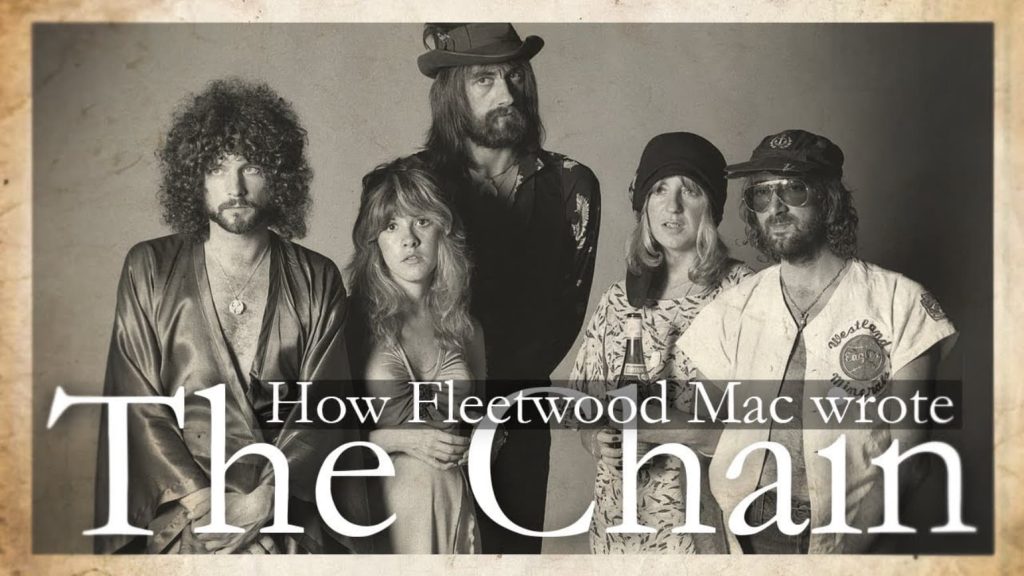
Fleetwood Mac – “The Chain”: An Anthem of Strength and Resilience
Fleetwood Mac’s “The Chain” stands as one of the band’s most enduring songs, a testament to their resilience and creative energy, even in the face of internal turmoil. Released on their landmark 1977 album Rumours, “The Chain” was a collaborative effort from all five members—Stevie Nicks, Lindsey Buckingham, Christine McVie, John McVie, and Mick Fleetwood—and is the only song on the album credited to the entire band. Despite the deep personal rifts and heartbreaks that plagued the group during the recording, the song serves as a powerful symbol of unity. Peaking at No. 9 on the UK Singles Chart upon its re-release in 1997, “The Chain” has become a fan favorite and a staple of Fleetwood Mac’s live performances.
Musically, “The Chain” is characterized by its distinctive bassline and hypnotic rhythm, creating a haunting, layered sound that is both intense and atmospheric. The track opens with a steady, fingerpicked acoustic guitar riff and ominous harmonies, setting a moody, almost foreboding tone. This introduction, written primarily by Lindsey Buckingham, draws listeners in, setting them on edge with its slow, relentless build-up. Stevie Nicks’s lyrics follow suit with lines like, “Listen to the wind blow, watch the sun rise.” The words are cryptic, alluding to the natural ebb and flow of relationships and the inevitability of loss and renewal.
One of the song’s defining moments is its legendary bassline, played by John McVie. This iconic riff, which kicks in about halfway through the song, became a signature element and has been used in various media, most notably as the theme for BBC’s Formula One coverage in the UK. When McVie’s bassline joins with Fleetwood’s pounding drumbeat, the song undergoes a dramatic shift. The restrained intensity of the intro gives way to a sense of urgency and raw power, mirroring the emotional tension within the band at the time. This moment in the song feels cathartic, almost as though the band is releasing its pent-up frustration and heartache through their instruments.
The lyrics, though relatively sparse, carry a strong message of loyalty and survival in the face of adversity. Nicks sings, “And if you don’t love me now, you will never love me again / I can still hear you saying you would never break the chain.” This refrain has a defiant edge, capturing the fierce determination and commitment to keep going despite personal betrayals and broken promises. It reflects the band’s own struggles, as they were dealing with painful breakups and fractured friendships while still working together. The line “never break the chain” takes on a dual meaning: it’s about holding on to love even when it hurts, and it’s also a vow to keep Fleetwood Mac intact despite everything.
The layered vocal harmonies are another crucial aspect of “The Chain,” with Nicks, Buckingham, and Christine McVie blending their voices to create a haunting, almost tribal sound. The harmonies emphasize the theme of interconnectedness, as if to say that no matter what happens between them, they are still bound together by their shared history and music. It’s a moment of unity in a song that often feels tense and emotionally charged.
“The Chain” is more than just a song—it’s a statement of survival. Fleetwood Mac’s ability to work together on this track, even while their personal lives were falling apart, shows the depth of their commitment to the music they were creating. This song is often interpreted as an anthem of resilience, a reminder that the things that bind us can be fragile yet unbreakable. It’s a song about love, loss, betrayal, and the complex ties that hold us together, even when we feel like falling apart.
Over the years, “The Chain” has become one of Fleetwood Mac’s most iconic songs, a live staple and a rallying cry for both the band and their fans. It serves as a reminder of their tumultuous yet incredible journey together and remains a powerful tribute to the strength it takes to keep going, no matter the odds. As the lyrics say, “I can still hear you saying you would never break the chain.” Fleetwood Mac’s legacy is proof that, despite the hardships, the chain endures.